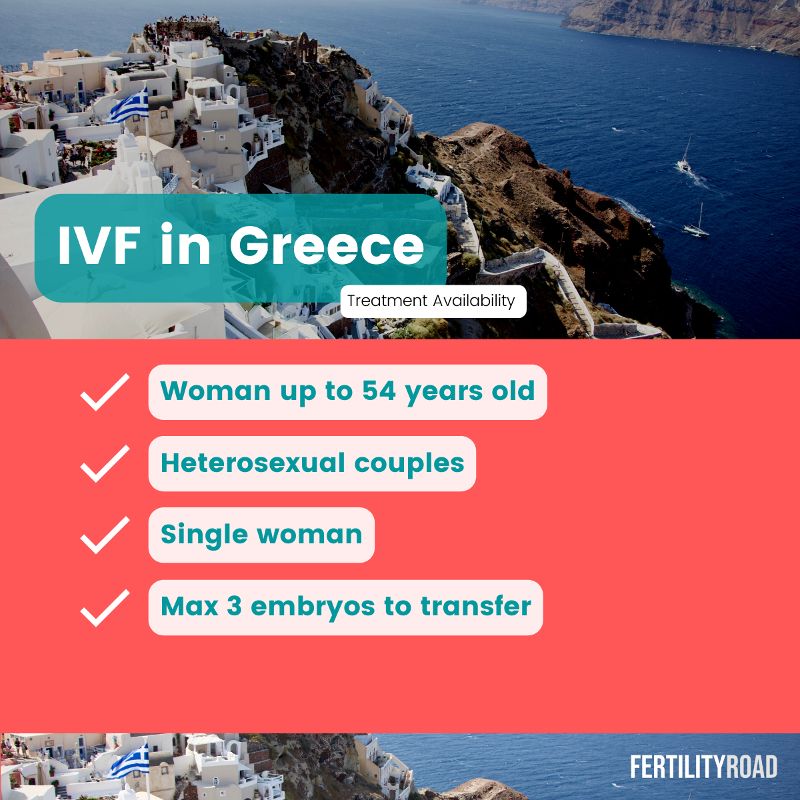
Looking for "best" IVF clinic abroad?
We analyse your needs, treatment type, destination preferences and find top IVF Clinics for you.
We analyse your needs, treatment type, destination preferences and find top IVF Clinics for you.

Last updated: July 8, 2025
Greece has around 40 IVF clinics, with 12 focused on international patients in cities like Athens, Thessaloniki, and Crete.
Women up to age 54 can access IVF, including single women and heterosexual couples; same-sex couples are not eligible.
Treatment costs range from €2,500–3,500 for own-egg IVF and €4,200–6,000 for donor-egg IVF; embryo donation and egg freezing are also available.
Donors are anonymous and carefully screened; clinics follow strict national regulations on donor age, testing, and embryo limits.
Success rates with donor eggs are high, and many clinics support international patients with English-speaking staff and coordinated travel care.
Greece is a very popular location for IVF treatment. Not only is it a beautiful country that is a popular holiday destination in its own right, but IVF treatment here is affordable and of a very high standard.
People visit Greece from all over the world for IVF treatment, and it is particularly popular for IVF abroad with patients from the UK, Ireland, Germany, France, Italy, the US and Australia.
IVF clinics are located throughout Greece, and the most popular places to receive treatment are Athens, Thessaloniki and Crete. There are about 40 IVF clinics in Greece. About 12 of these focus on international patients, most of which are located in Athens and Thessaloniki.
Greece enjoys good success rates for both IVF using own eggs and IVF using egg donation. Egg donors are anonymous, the clinics and doctors are highly experienced, and support for international patients is excellent. It’s also common for medical staff to speak English and German.
When arranging in-vitro fertilization (IVF) treatment through private doctors, Greece stands out in a unique way. While many doctors are affiliated with various hospital units where they perform surgeries, embryo transfers, and egg retrievals, they actually provide support and care to patients in their own private offices, separate from the IVF clinical settings.
Find Top IVF Clinics in Greece >
This practice is very common in Greece, particularly in the city of Athens. While it may seem unconventional, these IVF units provide patients with a highly positive experience and possess excellent IVF laboratories. Most IVF clinics in the country perform between 2,000 and 3,000 IVF cycles annually.
In Greece, IUI (intrauterine insemination) is allowed for heterosexual couples and AID (artificial insemination with a donor) is allowed for couples with male infertility and for single women. If you are planning solo motherhood via IUI in Greece, according to Greek law, you are obligated to sign a notarial deed in the presence of a notary and an official translator, including a statement that you are undergoing IUI treatment on your own to have a child. Most clinics in Greece can assist you with the necessary paperwork. The clinics accept female patients up to the age of 54, however, in order to undergo IUI, a woman has to have a mild form of infertility and healthy ovarian reserve. Donor sperm used in IUI treatment in Greece comes from strictly anonymous donors.
There are some legal aspects to keep in mind if you are considering getting IVF treatment in Greece, and one of the most important aspects involves the age of the patient. The maximum age for females in Greece is 54, but there is no age limit for males.
Heterosexual couples and single women can receive IVF treatment in Greece. However, female and male couples are unable to receive treatment.
The practice of IVF to choose gender is allowed, but only where it is used to prevent the transmission of a serious genetic disease.
HIV-positive patients can receive treatment in Greece, but this depends on the clinic so you will have to ask. The same is true for HCV/HBV positive patients.
The maximum number of embryos that can be transferred using a patient’s own eggs depends on the patient’s age. For patients under the age of 35, the limit is two embryos. For patients over the age of 40, or those aged 35 and older who have experienced two previous failed embryo transfers, the limit is three embryos.

Greece has a unique approach to fertility treatments that allows patients to receive comprehensive care and support:
Find Top IVF Clinics in Greece >
There are many egg donors available in Greece. Typically, the donors are Greek, Latino, Indian, Arab, and Caucasian in origin. However, some clinics may offer donors from additional backgrounds as well. There are no waiting lists, and both fresh and frozen oocytes are available.
The age of egg donors is between 18 and 25, and donors are strictly anonymous. Only basic information is shared by the clinic, depending on their decision. Neither the recipient couple nor the child can find out the identity of the donor. There is no mixed system with anonymous and non-anonymous donations.
There is no maximum number of donations by a single donor, but the maximum number of children born from the same egg donor is 10.
Donors are matched to recipients based on basic visual characteristics including race, hair colour, eye colour and skin colour, ensuring the greatest similarity to the recipients.
There are also several donor qualification tests that are required by law:
Find Egg Donation Clinics in Greece >
Many sperm donors are available in Greece, and all donor races are available. And there are no waiting lists, and most IVF clinics in the country have their own sperm banks.
The age of donors is between 18 and 40, and there is strict anonymity. There is no maximum number of donations that a single donor can make, but the maximum number of children born from the same donor is 10.

IVF Treatment Availability at emBIO About emBIO Medical Center emBIO is a fertility centre based in the Chalandri suburb of

IVF Treatment Availability at NewLife IVF Greece About NewLife IVF Greece Newlife IVF Greece has been treating Greek and international

IVF treatment availability at Pelargos IVF Medical Group About Pelargos IVF Medical Group Pelargos IVF Medical Group was founded by
It’s important to know the general costs of IVF treatment when choosing a destination. Different clinics will charge different amounts, and IVF costs abroad will vary depending on where you go. The cost of in-vitro fertilization (IVF) treatment in Greece is generally more affordable compared to many other European countries:
| IVF costs in Greece – basic packages | |
| IVF with own eggs in Greece | €2,500 – €3,500 |
| IVF with donor eggs in Greece | €4,200 – €6,000 |
| Embryo donation in Greece | €3,500 – €6,000 |
| Egg freezing (oocytes cryopreservation) in Greece | €2,500 – €3,000 |
Find Top IVF Clinics in Greece >
If you choose to receive IVF treatment via egg donation, the average cost of an egg donation cycle in Greece is between €4,200 and €6,000.
However, the cost can depend on several factors. These include the number of oocytes from a donor used for fertilisation, whether other “add-on” techniques are included, and whether the treatment is guaranteed (e.g. you’re guaranteed a certain number of embryos on day 3 or day 5).
Again, the cost will vary depending on the clinic and the location of the treatment.
If you are choosing to undergo IVF treatment via embryo donation, the average cost of treatment in Greece is between €3,500 and €6,000. This makes it one of the most expensive places in Europe to get treatment.
Availability is very good in Greece, and clinics offer embryos of many different ethnicities.
Double donation is also possible if you undergo IVF treatment in Greece. This is where oocytes from a donor and sperm are used. The cost is similar to egg donation costs, but you have to add on the cost of the sperm donor on top, and this usually costs between €250 and €500.
There are various other costs involved when you receive IVF treatment in Greece, which comprises different add-ons and other services. The main other IVF costs involved include:
| IVF costs in Greece – other costs and add-ons | |
| Medical consultation (doctor) | €100 – €250 |
| Sperm freezing | €300 – €350 |
| Donor sperm | €250 – €500 |
| Embryo Monitoring (Embryoscope, Time Lapse, Geri etc.) | €350 – €500 |
| Blastocyst culture | €400- €500 included in basic packages in most of the clinics |
| PGT-A / PGS genetic embryo testing* | €1,500 – €2,000 |
| Vitrification of (remaining) embryos and storage for 1 year | €400- €800 |
| FET – Frozen Embryo Transfer | €950 – €1,400 |
Find Top IVF Clinics in Greece >
It’s important to know the general success rates when making your decision on where to receive treatment. On average, Greece has good success rates.
According to the ESHRE EIM report for 2017:
You can see how this compares to other popular European destinations in the table below:
| Success Rates for IVF with own eggs in popular countries in Europe* | Women under 34 | Women aged 35-39 | Women aged 40+ |
| Spain | 25.8 | 23.2 | 11.7 |
| Portugal | 26.6 | 21.2 | 14.3 |
| Czech Republic | 29.7 | 21.6 | 8.9 |
| North Cyprus** | no data | no data | no data |
| Greece | 30.4 | 22.8 | 9.7 |
| Ukraine | 25.4 | 22.7 | 14.1 |
| Poland | 30.5 | 25.9 | 12.9 |
| Russia | 30.3 | 24.1 | 12 |
| Latvia | 29.4 | 33.6 | 20.7 |
| Denmark | 30.4 | 20.2 | 12.3 |
However, be aware that comparing results across different countries and clinics can often be confusing. The fact is that patient characteristics and treatments vary, and most clinics statistically achieve similar results.
IVF success rates tend to be higher when using donor eggs compared to using your own eggs, which is the same wherever you receive treatment.
Greece has excellent success rates compared to other popular destinations. Again, using information from the ESHRE EIM report from 2017:
You can see how this compares to other popular destinations in the table below:
| Egg Donation Success Rates in Popular Countries in Europe* | Pregnancies per fresh ET (%) | Pregnancies per thawed ET (%) |
| Spain | 54.7 | 51.1 |
| Portugal | 52.6 | 40.6 |
| Czech Republic | 42.2 | 23.1 |
| North Cyprus** | no data | no data |
| Greece | 54.7 | 50.1 |
| Ukraine | 61.6 | 62.2 |
| Poland | 34.4 | 44.7 |
| Russia | 48.0 | 45.0 |
| Latvia | 39.5 | 42.3 |
| Denmark | 38.6 | 33.7 |
Find Top IVF Clinics in Greece >
In Greece, EAIYA (The Greek National Authority of Assisted Reproduction) is the national organisation that supports IVF clinics in the country. The role of the authority is to provide suggestions, collect data and keep records of all cases relating to assisted reproduction. It also makes sure that clinics are functioning properly.
The Greek authorities provide no national success data for IVF treatment. However, certified IVF clinics in Greece are listed on their website, which you can find here.
If you are planning to travel to Greece for IVF treatment, it’s a good idea to know some more about the country including how to get there, what it’s like to travel around, and things to see and do in case you want to make an extended holiday of your time there. We cover everything you need to know in this guide to Greece.
Greece is a very safe country to visit. Tourism is a major industry for Greece, and people visit from all over the world every year. Petty theft can be a problem in crowded areas, especially during the height of the tourist season, but no more than in many other countries.
Just make sure you take precautions with your money, and leave your passport and money in the hotel safe. Also, there have been political demonstrations that can turn violent in recent years, so make sure you avoid any large gatherings.
Greece welcomes millions of visitors every year, especially during the summer months. Most people fly into one of its many international airports. Athens International Airport is the major travel hub, while other major airports include Heraklion International and Rhodes International. Many budget airlines fly to Greece from all over Europe, and there are long-haul flights from the USA, Australia and Canada.
An average return fare to Athens is $200 from London, $600 from New York and $1,500 from Sydney, but this depends on the time of year, airline and other factors.
Greece is in the Schengen area, so any EU nationals travelling from a country within this area can arrive and leave as they please. If you are travelling from outside the EU, you must show you have funds for the stay (about €50 per day) and be able to show return or onward travel tickets. You must also have medical insurance for the stay if you need a visa.
UK travellers must have a valid passport, but no visa is required. Travellers from the USA must have a passport that is valid for three months or more beyond travel dates, and no visa is required for stays up to 90 days. The same applies to travellers from Canada, Australia and New Zealand.
Getting around Greece is easy, and a popular option is to rent a car and travel by road. The country has a good road network, and there are lots of motorways between major cities. However, there are several toll roads, so keep cash on you. You should also make sure you carry a warning triangle and fire extinguisher, and you can find out more about the legal requirements when you rent a car.
The rail network covers the large towns and cities, and it is a convenient and affordable way to travel around the country. It also includes high-speed trains, but it’s a good idea to reserve ahead.
As such a popular tourist destination, it’s no surprise that Greece has lots to see and do. Relaxing on the beaches is one of the top activities, but there are lots of historical attractions as well.
Athens is the capital city and has lots of world-famous sites to visit including Hadrian’s Arch, the Temple of Zeus, the Acropolis and the Parthenon.
Thessaloniki is the next largest city behind Athens, and it is less crowded and a good place to explore on foot. One thing to see here is the White Tower.
Or you might want to explore the Greek Islands. There are over 6,000 in total, many of which are uninhabited. Crete is the largest and you could easily spend your entire holiday on the island.
Greece is a top destination for IVF treatment, not only because it is affordable and you can receive a high level of care. It is easy to reach, quite affordable and easy to travel around. It is packed with beautiful beaches, tavernas and historic attractions, and it’s an excellent choice for anyone seeking IVF treatment.
Seeking IVF treatment in Greece provides patients with a distinct advantage. With no waiting lists for egg donors, a wide range of donor profiles, and competitive pricing, Greece has become a popular international hub for affordable yet premium-quality fertility treatments. Alongside the medical expertise, Greece also offers fertility tourists the opportunity to visit a beautiful Mediterranean destination during their treatment journey.

| Cookie | Duration | Description |
|---|---|---|
| cookielawinfo-checbox-analytics | 11 months | This cookie is set by GDPR Cookie Consent plugin. The cookie is used to store the user consent for the cookies in the category "Analytics". |
| cookielawinfo-checbox-functional | 11 months | The cookie is set by GDPR cookie consent to record the user consent for the cookies in the category "Functional". |
| cookielawinfo-checbox-others | 11 months | This cookie is set by GDPR Cookie Consent plugin. The cookie is used to store the user consent for the cookies in the category "Other. |
| cookielawinfo-checkbox-necessary | 11 months | This cookie is set by GDPR Cookie Consent plugin. The cookies is used to store the user consent for the cookies in the category "Necessary". |
| cookielawinfo-checkbox-performance | 11 months | This cookie is set by GDPR Cookie Consent plugin. The cookie is used to store the user consent for the cookies in the category "Performance". |
| viewed_cookie_policy | 11 months | The cookie is set by the GDPR Cookie Consent plugin and is used to store whether or not user has consented to the use of cookies. It does not store any personal data. |